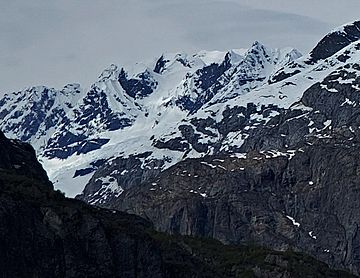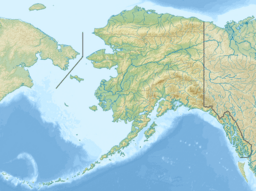Mount Turner (Fairweather Range) facts for kids
Quick facts for kids Mount Turner |
|
|---|---|

Mount Turner
|
|
| Highest point | |
| Elevation | 8,661 ft (2,640 m) |
| Prominence | 2,083 ft (635 m) |
| Parent peak | Mount Root (12,887 ft) |
| Geography | |
| Location | Hoonah-Angoon Alaska, United States Cassiar Land District British Columbia, Canada |
| Parent range | Fairweather Range Saint Elias Mountains |
| Topo map | USGS Skagway A-7 NTS 114P/3 |
| Climbing | |
| Easiest route | Mountaineering East face |
Mount Turner, also known as Boundary Peak 162, is a tall mountain covered in glaciers. It stands over 8,661 feet (2,640 meters) high. This impressive peak is part of the Fairweather Range within the larger Saint Elias Mountains.
Mount Turner is special because it sits right on the border between Canada and the United States. Specifically, it's located between southeast Alaska and British Columbia. The mountain marks a shared boundary for Glacier Bay National Park in the US and Tatshenshini-Alsek Provincial Park in Canada.
You can find Mount Turner about 8 miles (13 km) west of Tarr Inlet. It's also about 4.4 miles (7.1 km) southwest of Mount Forde, which is its closest neighbor. Mount Turner is the highest point on the land that separates two large ice rivers: Ferris Glacier and Margerie Glacier.
The mountain got its name from George Turner (1850-1932). He was an important American politician. In 1903, he was part of a group called the Alaska Boundary Tribunal. This group helped settle a disagreement about where the border between Alaska and Canada should be. The name "Mount Turner" was officially recognized on March 31, 1924.
Understanding Mount Turner's Climate
Mount Turner has a type of weather called a subarctic climate. This means it experiences very cold, snowy winters. The summers are usually mild, not too hot.
Temperatures and Wind Chill
During winter, temperatures on Mount Turner can drop below −20 °C (which is about -4 °F). When the wind blows, it can feel even colder. This is called the wind chill factor. It can make the temperature feel like it's below −30 °C (-22 °F).
Glaciers and Water Flow
Because of this cold climate, Mount Turner has small glaciers hanging on its slopes. Larger glaciers, like the Margerie Glacier to the south and Ferris Glacier to the north, are also supported by these conditions. All the melted ice and snow from these glaciers flow into the Glacier Bay Basin.
 | John T. Biggers |
 | Thomas Blackshear |
 | Mark Bradford |
 | Beverly Buchanan |


